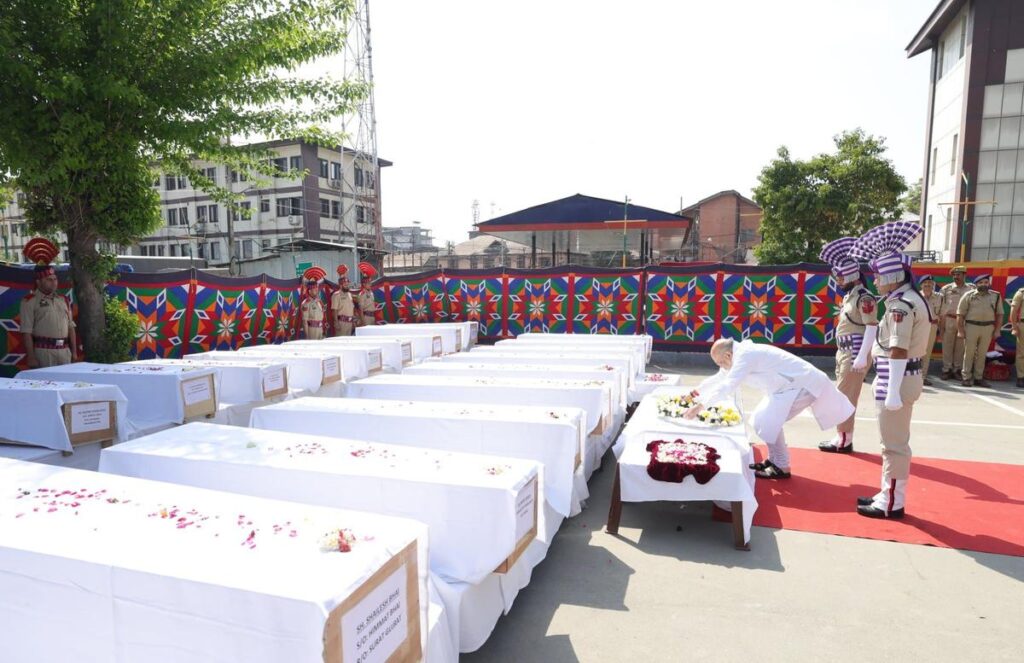Special Story: Pahalgam terrorist attack: Whose failure and whose responsibility?
Pahalgam terrorist attack: This issue is very serious! It will also include public reaction, expert opinions, the political context, and the question of government responsibility.
- Why the silence even after four days?
- Is there a deep crack in national security?
By our Special correspondent | New Delhi
The terrorist attack on April 22 in Pahalgam, a tourist destination in Jammu and Kashmir, not only claimed many innocent lives but also shook the entire country once again. Even four days after the attack, the government or any top security agency has not officially accepted any accountability. In this context, the question arises : whose failure resulted in this attack — that of Prime Minister Narendra Modi’s government, the national security agencies, or the increasing political negligence due to electoral equations?
Terror during the election season : A conspiracy or coincidence? Experts believe that the Pahalgam attack occurred at a time when the electoral atmosphere is heating up in important states like Bihar and West Bengal. The Pulwama attack (2019) is remembered for how a major terrorist attack completely changed the electoral narrative. Is the Pahalgam attack also part of a conspiracy for a larger electoral impact?
Senior political analyst Praveen Verma says, “Whenever elections approach, events that intensify nationalism rapidly increase. The question is, how does this happen repeatedly and why are security agencies failing?” Failure of the national security apparatus? The level of terrorist infiltration and attack in an area like Pahalgam, which is considered safe, clearly indicates a significant lapse in intelligence inputs and ground security. Retired DGP and security expert Vijay Chaudhary says,
Silence of the Modi government
Growing distrust among citizens. Even after four days, Prime Minister Narendra Modi or Home Minister Amit Shah has not held any concrete press conference regarding the attack. Only a few Twitter messages have expressed ‘condolences’. Meanwhile, the anger of the general public is escalating.
Nidhi Sharma, a resident of Delhi and social activist, says, “We are always confronted by leaders asking for votes in the name of security-nationalism, but when the real questions arise, they all disappear.” On social media, hashtags like ‘#SecurityFailure’ and ‘#AccountabilityNeeded’ are also trending. Citizens are asking that if the government itself fails to provide security, then how can ordinary people feel safe?
Is this political management?
Experts believe that the government is trying to gradually erase this issue from the public’s mind by adopting a ‘silence strategy’ after the attack. Political analyst Reena Datta says, “This is a well-thought-out strategy — the government remains silent after the attack so that the issue cools down quickly and does not affect the electoral agenda. But the question will remain — who is ultimately responsible?”
The Pahalgam attack is not just a terrorist incident
It has become a symbol of the major failure of the national security apparatus, political leadership, and democratic accountability. Unless the government and agencies demonstrate transparency and accountability, the fear and distrust in the minds of citizens will not dissipate. In a democracy like India, the response to the martyrdom of soldiers cannot be ‘silence’. It is essential to ask questions and even more crucial to ensure accountability.
Did the bus go without an escort?
According to security protocols, buses carrying tourists in sensitive areas should be accompanied by local police and paramilitary forces for security. However, at the time of the attack, the bus was neither in a security cordon nor was there any security vehicle accompanying it.
A lack of coordination between the local police and intelligence, a senior security officer, who wishes to remain anonymous, states, “Just two days before the attack, there were reports of suspicious activities in a village adjacent to Pahalgam, but no concrete action was taken. This clearly indicates a serious communication gap between the agencies.”
Potential political-terrorist nexus?
Professor Dr. Habib Sheikh of Jammu University and an expert on terrorism says: “Such events have happened before in India before elections. This is not just a terrorist warning, but it could also be related to political conspiracies. Sometimes the possibility of such attacks cannot be ruled out to create a ‘distract narrative .’”Anger on social media Citizens’ anger has erupted on social media. Some key reactions, “The Pahalgam attack is a disgraceful failure of security arrangements.
What have we learned from Pulwama?”
“When the soldiers’ bodies are used for votes, there should also be accountability.” “Ask those who say terrorism has ended in Kashmir – who will answer for the bodies in Pahalgam?”
Is anyone accountable?
The Pahalgam attack is not only a failure of the security apparatus but also exposes the current government’s tendency to evade accountability. No minister arrived at the site, nor was any inquiry committee announced. In this silence, only the people’s questions resonate – ‘Who is ultimately responsible?’


